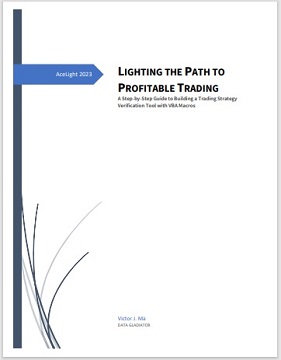The Power of Arbitrage Stock Trading: Strategies, Benefits, and Risks
|
|
Have you ever heard of the term "arbitrage"? No, it's not a new type of
dance move or a fancy way of saying "garbage". It's actually a sophisticated
trading strategy just like finding money on the ground, except you have to
be quick and smart to pick it up. It's like playing a game of
spot-the-difference, except the differences are in stock prices and the
stakes are much higher than a children's magazine.
Arbitrage is a
popular trading strategy in the stock market that involves taking advantage
of the price differences of an asset in different markets. In simple terms,
arbitrageurs buy an asset in one market and sell it in another market where
the price is higher, making a profit in the process.
Arbitrage is a
popular trading strategy in the stock market that involves taking advantage
of the price differences of an asset in different markets. In simple terms,
arbitrageurs buy an asset in one market and sell it in another market where
the price is higher, making a profit in the process. In this article, we
will explore the basics of arbitrage stock trading strategies, how they
work, and their benefits and risks.
What is Arbitrage Stock Trading?
Arbitrage stock trading is a trading strategy that involves buying and
selling the same security on different markets or exchanges to take
advantage of the price difference. The goal is to make a profit by
exploiting the inefficiencies in the market that result in different prices
for the same security. The price differences may arise due to differences in
the supply and demand dynamics, market inefficiencies, or any other factors
that affect the market.
Arbitrage is a popular trading strategy in
the stock market due to its low-risk and high-profit potential. The strategy
is based on the premise that the market will eventually correct itself, and
the price differences will disappear. Arbitrageurs take advantage of the
temporary price differences, which they believe will eventually converge, by
buying the undervalued asset and selling the overvalued one.
Types of
Arbitrage Trading Strategies
There are several types of arbitrage
trading strategies, which include:
1. Merger Arbitrage
Merger
arbitrage involves buying and selling stocks of two merging companies to
take advantage of the price differences that occur before and after the
merger. The strategy is based on the assumption that the stock prices of the
two merging companies will converge after the merger is completed.
For instance, suppose Company A is acquiring Company B. If the stock price
of Company B is undervalued in the market, an arbitrageur can buy the stock
at a lower price before the merger and sell it after the merger is
completed, making a profit from the price difference.
2. Dividend
Arbitrage
Dividend arbitrage is a strategy that involves buying and
selling stocks before and after the dividend payout date. The strategy is
based on the premise that the stock price will increase before the dividend
payout date and decrease after the payout date.
For example, suppose
a company announces that it will pay a dividend of $1 per share to its
shareholders. If an arbitrageur buys the stock before the ex-dividend date
(the date on which the stock price is adjusted to reflect the dividend
payment), they will receive the dividend payout and then sell the stock
after the ex-dividend date, making a profit from the price difference.
3. Statistical Arbitrage
Statistical arbitrage is a trading
strategy that involves taking advantage of the price differences of two or
more securities that have a historical correlation. The strategy is based on
the assumption that the correlation between the securities will eventually
correct itself, and the price differences will disappear.
For
example, suppose two stocks, A and B, have a historical correlation of 0.7.
If the price of stock A is undervalued compared to its historical
correlation with stock B, an arbitrageur can buy stock A and sell stock B
short, making a profit from the price difference when the correlation
between the two stocks converges.
Benefits of Arbitrage Stock Trading
Arbitrage stock trading has several benefits, which include:
1.
Low-risk Investment
Arbitrage stock trading is a low-risk investment
strategy as it involves taking advantage of temporary price differences in
the market. The strategy is based on the premise that the market will
eventually correct itself, and the price differences will disappear.
2. High-profit Potential
Arbitrage stock trading is known for its
high-profit potential. This is because the prices of securities can vary
significantly, especially in the short term, which allows investors to take
advantage of these price differences. By employing an arbitrage strategy,
investors can generate profits by buying a security at a lower price and
then selling it at a higher price, exploiting the price difference between
the two.
3. Diversification
Arbitrage stock trading allows
investors to diversify their investment portfolios by investing in different
markets or exchanges. This reduces the overall risk of their investments and
provides an opportunity to generate profits from multiple markets.
4.
Quick Turnaround Time
Arbitrage stock trading has a quick turnaround
time as the investor can buy and sell securities within a short period. This
allows investors to generate profits quickly and reinvest their profits in
other investment opportunities.
Risks of Arbitrage Stock Trading
Arbitrage stock trading also has several risks, which include:
1.
Market Risk
Arbitrage stock trading is subject to market risk, which
includes fluctuations in the stock prices, changes in interest rates, and
geopolitical events. These factors can affect the market dynamics and lead
to unexpected losses.
2. Liquidity Risk
Arbitrage stock
trading is subject to liquidity risk, which arises when the investor is
unable to buy or sell securities due to a lack of market participants or low
trading volumes. This can lead to losses or missed opportunities for profit.
3. Execution Risk
Arbitrage stock trading is subject to execution
risk, which arises when the investor is unable to execute the trades due to
technical issues, such as system failures, connectivity issues, or delays in
trade confirmation. This can lead to missed opportunities or losses.
4. Regulatory Risk
Arbitrage stock trading is subject to regulatory
risk, which arises when the investor is unable to execute trades due to
changes in regulations or restrictions on trading activities. This can lead
to missed opportunities or losses.
 In conclusion, if you're looking
for an interesting scheme, arbitrage stock trading might be right up your
alley. Just remember to keep your wits about you and don't let the market
fluctuations get to your head (or heart). And if you ever find yourself in a
state of panic, just take a deep breath and remember this quote from the
legendary investor Warren Buffet: "Be fearful when others are greedy, and
greedy when others are fearful." In conclusion, if you're looking
for an interesting scheme, arbitrage stock trading might be right up your
alley. Just remember to keep your wits about you and don't let the market
fluctuations get to your head (or heart). And if you ever find yourself in a
state of panic, just take a deep breath and remember this quote from the
legendary investor Warren Buffet: "Be fearful when others are greedy, and
greedy when others are fearful."
In
all seriousness, arbitrage stock trading can be a lucrative investment
strategy if done correctly. But like any investment, there are risks
involved, and it's important to do your research and seek advice from
professionals before diving in. So, good luck, and may the odds be ever in
your favor (and your bank account's favor too).
By the way, it's crucial to thoroughly
test any trading strategy before using it in live markets. This means
conducting both back-testing and forward-testing to evaluate the strategy's
effectiveness and identify potential flaws or weaknesses. If
you want to succeed in the stock market, make sure to prioritize testing
before putting your capital at risk. For more information, Click
LIGHTING THE PATH TO PROFITABLE TRADING: A Step-by-Step Guide to Building a Trading Strategy Verification Tool with VBA Macros to get the whole tutorial handbook for free!
And click Free Trial to download strategies testing tools, all for a 30-day Free Trial.
Click on Subscription to order more strategies testing tools to help your stock trading.
|


|

Free Tutorial
Share
|
|
|
|